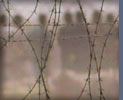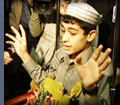1980s | Afghan war against the Russians |
Muslims around the world volunteered to go to Afghanistan to fight a jihad, or holy war, against the Soviet invaders. Among these volunteers was a Canadian citizen, originally from Egypt, named Ahmed Said Khadr. During the jihad, Khadr met and befriended Osama bin Laden.
|
 |
1993 | Khadr family moves to Afghanistan |
 In Afghanistan, Ahmed Said Khadr ran a charity organization devoted to feeding and schooling Afghan orphans. Allegations later emerged that he was also involved in Al Qaeda. In Afghanistan, Ahmed Said Khadr ran a charity organization devoted to feeding and schooling Afghan orphans. Allegations later emerged that he was also involved in Al Qaeda.
In the early 1990s, Khadr's oldest sons Abdullah and Abdurahman attended the Al Qaeda training camp at Khalden, Afghanistan, where both received weapons training. Abdurahman was repeatedly punished and expelled from the camps for rebellious behavior.
|
 |
1995 | Ahmed Said Khadr arrested in Pakistan |
The Khadr family patriarch was arrested and accused of complicity in a terrorist bombing of the Egyptian embassy in Islamabad that killed 15 people. He began a hunger strike and after an intervention from Canadian Prime Minister Jean Chrétien he was released in mid-1996.
Following his release, Khadr moved his family to a large compound of houses near Jalalabad, Afghanistan, which also housed Osama bin Laden and his family.
|
 |
February 1998 | Osama bin Laden issues fatwa |
Bin Laden officially declared war against the United States when he issued this decree authorizing the killing of American civilians.
|
 |
Aug. 7, 1998 | Bombings of U.S. embassies in Africa |
 The U.S. embassies in Kenya and Tanzania were simultaneously bombed by Al Qaeda operatives in an attack that killed more than 220 people, including 12 Americans. Over 5,000 were injured in the bombings.
Abdurahman Khadr says he was in an Al Qaeda guesthouse in Afghanistan when he heard the news of the bombings. He says that people drank juice and celebrated the news.
|
 |
Aug. 20, 1998 | U.S. retaliates for embassy bombings |
|
Two weeks after the embassy bombings, the U.S. launched cruise missile strikes from warships in the Arabian Sea. One strike was targeted at a suspected chemical weapons plant in Khartoum, Sudan and the other was targeted at bin Laden's training camp near Khost.
Abdurahman Khadr says he was in the Khost camp when the missiles arrived. He says many people were killed and that people in the camp expected American soldiers to follow with a ground attack.
|
 |
Sept. 9, 1999 | Bin Laden attends Khadr wedding |
Osama bin Laden attended the wedding of Ahmed Said Khadr's daughter Zaynab. Later, in 2001, members of the Khadr family attended the wedding of bin Laden's son Muhammed.
|
 |
Oct. 12, 2000 | Attack on USS Cole |
An Al Qaeda suicide bombing attack against the USS Cole killed 17 American sailors in Yemen.
|
 |
Sept. 11, 2001 | Al Qaeda attacks World Trade Center and Pentagon |

Following the attacks, Osama bin Laden and other senior Al Qaeda figures fled to the tribal areas on the Afghan-Pakistani border.
The Khadr family also decided to flee, but Abdurahman made the decision to separate from the family and try to return to Canada.
|
 |
Oct. 7, 2001 | Bombing campaign begins |
The U.S. and Britain began bombing strikes against Taliban government installations and Al Qaeda training camps in Afghanistan.
|
 |
November 2001 | Abdurahman Khadr arrested |
Abdurahman became separated from his family in Kabul, Afghanistan, which was being taken over by the Northern Alliance. At the time, any Arab in Kabul was suspected of affiliation with bin Laden and the U.S. offered a bounty for Al Qaeda members.
Abdurahman was arrested and released several times before he ended up in an Afghan prison. After six weeks, he was handed over to U.S. forces. He says he was extensively interrogated by two U.S. agents -- one from the FBI and one from the CIA -- who became interested in him when they realized how close he had been to the center of Al Qaeda.
According to Abdurahman, over the next several months he traveled around Kabul with American investigators and pointed out Al Qaeda members and safe houses.
|
 |
July 2002 | Omar Khadr captured in Afghanstan |

Omar was sent to the U.S. Naval base at Guantanamo Bay, Cuba after he allegedly killed a U.S. Special Forces medic with a hand grenade. An October 2002 Washington Post story described Omar as a "particularly talkative prisoner" in Guantanamo. The story quoted an unidentified U.S. official as saying, "He's singing like a bird," and that Omar was offering information about his father's activities.
A Jan. 30, 2004 Washington Post story reported unidentified officials suggesting that Omar will be tried in front of a military tribunal when he turns 18.
|
 |
Summer 2002 | Abdurahman receives CIA offer |
After living for nine months in a CIA safe house, Abdurahman says he received a financial offer from the CIA. The agency offered him a $5,000 bonus for being cooperative and offered to pay him $3,000 per month for his assistance.
|
 |
Early 2003 | Abdurahman sent to Guantanamo |

At the request of the CIA, Abdurahman agreed to go to Guantanamo and serve as an informant amongst the prison population, although he maintains he did not know about the harsh conditions there.
Like all other prisoners, Abdurahman spent his first month at Guantanamo in complete isolation before he was moved into the general prison population. At one point, he discovered his brother Omar was imprisoned only 50 feet away in a neighboring yard.
|
 |
Mid-2003 | Abdurahman moved out of prison population |
Abdurahman says that the CIA realized its plan wasn't working and the agency agreed to transfer him out of the general prison population to more luxurious quarters. He says he told the CIA that the vast majority of inmates in Guantanamo do not belong there and that it had been a huge mistake for the Americans to offer large cash rewards for the capture of Al Qaeda suspects.
According to Abdurahman, he spent several months in the Guantanamo guest quarters near the prison before the agency decided it needed his help infiltrating the Iraqi insurgents.
|
 |
September 2003 | Abdurahman trained by CIA, sent to Bosnia |

Abdurahman says the CIA provided him with a training course in undercover work taught by one of the most experienced trainers in the CIA and that at the end of the course he was told that he would be leaving Guantanamo soon. He was given a tour of the base, issued a guest pass and checked in and out through the visitor's gate. Then, he says, the CIA told him his next stop was Bosnia and gave him a false Moroccan passport.
In Bosnia, which the U.S. believes has become a pipeline for Al Qaeda volunteers who want to join the Iraqi resistance, Abdurahman says the CIA asked him to blend in with the transient Muslim population and attend the King Fahd mosque, one of the largest mosques in Sarajevo. He says he became friendly with a suspected recruiter for Al Qaeda operations in Iraq, which pleased the CIA.
|
 |
Oct. 2, 2003 | Ahmed Said Khadr killed in Pakistan |
Khadr was holed up in a house in the Pakistani province of Waziristan when the Pakistani army received a tip that senior Al Qaeda figures were in the house. The army surrounded the house and demanded a surrender. After an intense firefight that raged for hours, a Pakistani helicopter gunship shelled the house. Two Pakistani soldiers were killed in the battle, 18 prisoners were taken and eight bodies were pulled from the rubble of the shelled house, including the body of Ahmed Said Khadr, which was later identified through DNA testing. His 14-year-old son Abdul Karim was wounded in the battle.
Abdurahman was in Bosnia when he received word of the attack that killed his father. He denies having given the CIA any information that would have led to his father's death.
|
 |
Nov. 30, 2003 | Abdurahman arrives in Toronto |

Abdurahman says that after a few weeks in Bosnia, the CIA asked him to go to Iraq with Al Qaeda forces in order to provide information to the U.S. military. At this time, Abdurahman decided he wanted to leave the CIA. He called his grandmother in Toronto and told her he desperately wanted to come back to Canada. He also says he asked her to tell the media that the Canadian government was not helping him.
Abdurahman says that after he went public with his story, the CIA brought him to a safe house in Sarajevo and agreed to let him leave if he promised to keep his relationship with the agency a secret. He says the CIA never paid him the promised monthly salary and that they took away his false Moroccan passport before dropping him off at the Canadian embassy in Sarajevo.
Upon arrival in Toronto, Abdurahman was greeted by his grandmother. Shortly afterwards, he held a press conference in which he repeated what he now describes as his CIA cover story -- that he had been deposited in Afghanistan after his release from Guantanamo and had made his way to Bosnia on his own.
|
 |
February 2004 | Abdullah Khadr accused of suicide bombing |
A Taliban official tells Agence France-Presse that Abdullah Khadr was behind a January 2004 suicide attack on Canadian soldiers in Kabul, Afghanistan that killed one soldier. Abdullah denies the charge, telling FRONTLINE correspondent Terence McKenna, "If I was the suicide bomber, I wouldn't be doing this interview with you right now."
|
 |
March 2004 | Abdurahman tells his story to Canada |
Abdurahman says he told the Canadian Broadcast Corporation (CBC) about his work for the CIA because, "I cannot keep it in my heart anymore. I gotta tell people. I lied to them in the beginning, and I want this to get out. I want the people to learn that I lied for a reason and I'm sorry to have lied to them."
After his story was broadcast in Canada, his grandmother kicked Abdurahman out of the house and he was disowned by the rest of his family.
|
 |
April 9, 2004 | Maha and Karim return to Canada |

Maha Elsamnah returned to Toronto to seek medical treatment for her 14-year-old son Karim, who had been paralyzed in the attack that killed his father. Although Maha told the media, "I have no connection to Al Qaeda," their return stirs up controversy among the Canadian public, politicians and the media over whether the family's citizenship should be revoked.
Since Maha and Karim's return to Canada, the Khadr family has begun a reconciliation.
|
 |